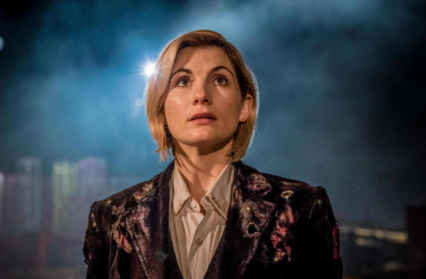Critic Thomas Tyrell reviews Season 11 of Doctor Who, the first season with Jodie Whittaker taking on the eponymous role.
With The Battle of Ranskoor av Kolos, Jodie Whittaker’s first series as the Doctor ends with a visually spectacular episode that brings the emotional arc of the series to a close. With all the culture wars this new incarnation has provoked, not enough has been said about the high production values of this show, which has used its location filming in South Africa to brilliant effect. The previous series hopped the pond to give us America being America, but the production team cannily reuses the relatively unknown South African landscapes to give us the acid shores of an alien planet, 1950s Alabama and Punjab at the time of Partition. It’s even more endearing than the series finale returns to that most staple of Doctor Who locations, the quarry-as-alien-planet and pulls it off spectacularly, scattering the bare rocks with eerie mists, crashed spaceships and floating megaliths. Apart from one extremely trippy moment in It Takes You Away which saw Jodie Whittaker acting her socks off opposite a frog in a chair, the series has been an absolute visual feast, bringing Doctor Who into the High Definition era in style.
The villainous Tim Shaw (or Tzim-Sha, to use the proper sci-fi pronunciation) returns for the series finale, seeking revenge for his humiliation in the opening episode. This provokes the Doctor’s companion Graham into seeking revenge for his wife Grace, who died as a result of Tzim Shaw’s actions, whilst her grandson Ryan is adamant that this is not what Grace would have wanted. It’s a fine piece of TARDIS team drama, somewhat weakened by having a whole series’s worth of stories in between. Showrunner Chris Chibnall has clearly decided to tread lightly where overarching plots are concerned, after the time-travelling puzzle boxes of the Moffat years, but that does leave the series as a whole with a rather disconnected feeling. The emotional impact of Grace’s death in The Woman Who Fell to Earth peters out a few episodes later, and the unfinished business is only picked up as the series draws to a close, leaving us with a few too many middle episodes where the TARDIS crew don’t seem to develop or have much in the way of conflict or drama.
This series made many exciting and courageous new decisions, starting with the casting of Jodie Whittaker as the Doctor, but also in casting a large, diverse TARDIS crew, and giving us the first story without a single white character aside from the regular cast. (The First Doctor adventure The Aztecs doesn’t count, because it was the BBC in 1963, and not one actor was Latin American.) That said, it’s hard not to feel that they’ve also hedged their bets by opting for the safe option in other places.
Take The Thirteenth Doctor. There’s a lot to enjoy here, including the heroic screwdriver stance, the talent for delegation, and the enthusiasm for engineering (so far limited to whizzy outer space tech; in my dream episode she’d battle steampunk aliens with Isambard Kingdom Brunel). I just wish the scripts allowed her to be less nice, to show the flashes of darkness we see in every other Doctor. By contrast, David Tennant showed his steel in his very first episode, offering the leader of the Sycorax mercy but making it clear that there were no second chances. The previous series have shown that the Doctor shouldn’t travel alone, that he needs his companions to stop him from making bad decisions; yet in Kerblam!, the only episode this series where the Doctor allows the villain to be hoist by his own petard, she’s allowed to do so without facing any backlash from Yaz, Graham or Ryan. It’s a missed opportunity to show that the Thirteenth Doctor has an edge to her moral righteousness and that she can be just as fierce as her male incarnations if someone oversteps the line.
My favourite episode of this series was the riskiest: Rosa, which saw the Doctor fighting a time-travelling racist in Montgomery, Alabama, to ensure that the foundational events of the Civil Rights Movement would happen as history intended. How spectacularly that story might have gone wrong! In the run-up to broadcast, I kept imagining Speed with Rosa Parks, or The Doctor teaming up with Rosa Parks to desegregate the intergalactic bus system. What we got was a sensitive story that showed the vileness of the Jim Crow south and those who would sing its praises, which let the Doctor and her companions be implicated in its closing solution, and which showed you don’t have to join the TARDIS crew to be a hero. It’s an episode that can hold its head high among the best of the Russell T Davies and Stephen Moffat eras, and for a new showrunner on his first series, that’s a considerable achievement.
Watching Doctor Who is an intensely subjective experience: I know from experience there are hundreds of people on the internet ready to sing the virtues of stories I thought were lacklustre, like The Witchfinders, Arachnids in the UK and Demons of the Punjab, and tear down the ones I thought were fine examples of what Doctor Who can do, like Rosa, The Tsuranga Conundrum and The Woman Who Fell To Earth. However, regardless of what we loved or hated, this series proved the misogynists and sceptics wrong by giving us a gripping, capable female Doctor who could more than carry the show. I’m fired up for the New Year special and only disappointed that we’re going to have to wait until 2020 for Jodie Whittaker’s next series.
Another Wales Arts Review discussing the sci-fi phenomenon Doctor Who is available here.
Thomas Tyrrel is a critic and regular contributor to Wales Arts Review.












